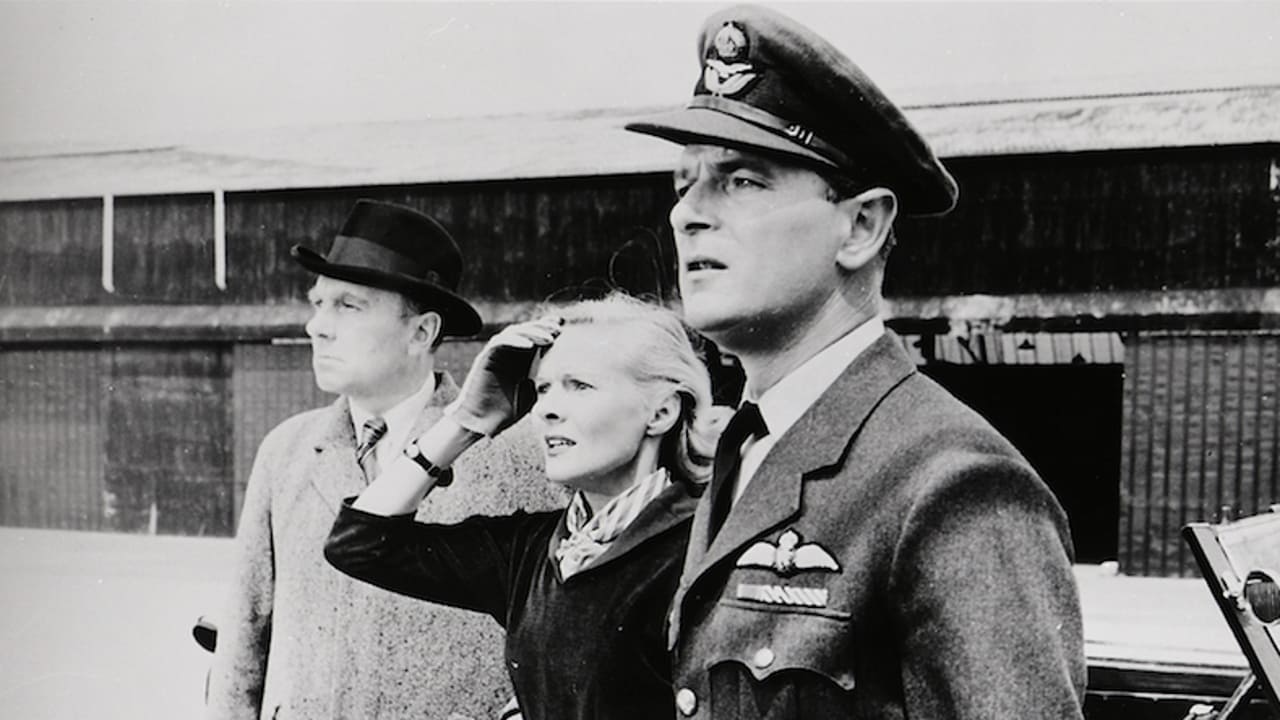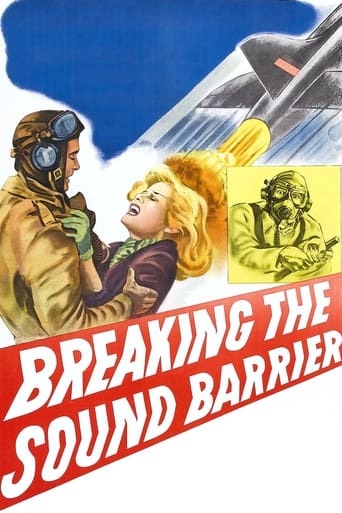Karry
Best movie of this year hands down!
pointyfilippa
The movie runs out of plot and jokes well before the end of a two-hour running time, long for a light comedy.
Calum Hutton
It's a good bad... and worth a popcorn matinée. While it's easy to lament what could have been...
Abegail Noëlle
While it is a pity that the story wasn't told with more visual finesse, this is trivial compared to our real-world problems. It takes a good movie to put that into perspective.
coolantic
Yes, if ever there was a case of life trumping art, this was it. O.K. we all know NOW that Chucky Egg actually broke the sound barrier in 1947, but apparently this was not widely publicized at the time. Having said that, this film was only ever going to be a fiction. And nothing dates quicker than yesterday's view of tomorrow. Not one of David Lean's best, it features the dashing Nigel Patrick as a test pilot avidly pursuing the breaking of the titular maguffin. Having conveniently married Susan Ridgefield ( an oddly unattractive Anne Todd) he is enthusiastically supported in his quest by her father John Ridgefield, a rough-as-a-bear's-bum Yorkshire plane builder, played by Ralph Richardson, with a dodgy accent. Unfortunately, our Nigel gets killed and it is left to his pal Phil, played by the excellent, but underrated John Justin, to complete the job.
Knowing the history you do wonder why they bothered even making this film. Apart from featuring some wonderful British jets of the fifties, the technical stuff is pretty basic, and the ultimate solution to the problem i.e. reversing the aircraft controls , is hardly believable. However, a nice humorous touch comes right at the end when Phil's wife (beautiful Dinah Sheridan) bothers him fussily about the children's new coats, just when he wants to tell her what he's achieved! In another scene, the film is prophetic. When questioning her father regarding the reason for wanting the break the sound barrier she mentions that an airliner will be able to fly to New York in 3 hours. He says "Two." She responds. "So a few, very rich people will be able to spend the weekend in New York!" Remind you of a particular Anglo-French plane?
Anyway, cinema rarely sticks to the facts. I mean the Brits could try claiming that they obtained the German Enigma coding machine from a captured U-boat. But Hollywood says different!
writers_reign
It's a fact universally acknowledge that some writers work better with some directors than others and vice versa. Working separately director Marcel Carne made one great film (Hotel du Nord), several decent films (Therese Raquin, Julia ou le cle des songes) and several ho-hum entries; also working separately Jacques Prevert fared slightly better writing Le Crime de Monsieur Lange, Les Amants de Verone, Voyage Surprise, Un oiseau rare among other but TOGETHER they made seven of the most distinguished movies in French cinema and if you want me to list them you clearly stepped in here to get out of the rain, the Multiplex is three blocks down. Terry Rattigan worked best with Puffin Asquith and David Lean with Noel Coward yet here we have Lean directing a Rattigan screenplay. You can see Lean's thinking; he didn't want to go through life riding on the coat-tails of Coward, what Rattigan didn't know about constructing a play could fit in an eye-dropper and still leave room for an eight-to-one martini, he'd served in the RAF during the war and had written one of the two finest British war films actually produced during the war, The Way To The Stars - the other was In Which We Serve, written, produced, starring and co-directed by Coward with Lean. On paper this was great, get some stats about supersonic flight, turn them over to Terry and let him flesh them out and humanise them. Mostly it's good but it COULD have been great - think Sinatra and Lawrence Welk; put these two together and you'll get an album that neither has to be ashamed of but team Sinatra with Billy May, Gordon Jenkins, Nelson Riddle and we're talking Hall of Fame. So: We have a lyrical opening sequence in which a plane is 'stooging' about over the channel with the cliffs of Dover prominent; there's a carefree, buoyant, waltz-time feel that sets us up for the revelation that this is wartime. Pilot John Justin goes into a dive and when the plane begins to shudder he finds it difficult to throttle back, an experience he discusses with chum Nigel Patrick back on the aerodrome; Patrick, however, is in love and not interested but the object of his affection, Ann Todd, just happens to be the daughter of a leading aircraft manufacturer, Ralph Richardson, who offers Patrick a job as test pilot after the war. Rattigan gets this over economically so that we can cut to the chase, which, in this case, is the quest for fire i.e. designing and building a plane capable of supersonic flight. In only his second film Denholm Elliott unveils the prototype for his series of weak, callow youths, in the role of Todd's kid brother who funks his first solo and winds up on the menu. Leslie Phillips, sans moustache gets twice as much screen-time as Elliott but is totally forgettable leaving the real acting to the big boys. Nigel Patrick had just come off Rattigan's The Browning Version - with Puffin Asquith at the helm - and played essentially the same role if schoolteachers were piloting jet planes or pilots were flying desks. Nigel Patrick was one of the old school stage actors, shoot cuffs first, ask anyone for tennis later and enhanced virtually every film in which he played. This is a film you want to like and mostly do if only ...
Jim Atkins
This is an outstanding film about the human cost of progress and obsession. Richardson is great as the aviation mogul willing to pay the necessary price for reaching new realms and new worlds. Historically and technically, the film is so out in left field as to be almost laughable (the plot point about control reversal is apparently the result of a writer hearing a valid aeronautical term and misunderstanding it completely) but in the end, the issues raised and the fine performances make Sound Barrier a winner. The aerial photography is outstanding, and there is one beautifully composed shot from below the nose of the Comet airliner that perfectly emphasizes the sleek lines of that most beautiful jet.
davep-15
The movie really does capture a sense of time and the tremendous bravery of those involved in the breaking of the sound barrier.The cast is excellent and as usual Denholm Elliot steals every scene he's involved in. I feel this film is under-rated and is typical of much of the good work of British Cinema in the 50's

